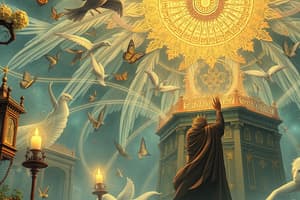Podcast
Questions and Answers
What time frame does Chapter 1 cover?
What time frame does Chapter 1 cover?
- 1946 to 1959
- 1930 to 1940
- 1940 to 1950
- 1938 to 1946 (correct)
Who is the narrator of Chapter 2?
Who is the narrator of Chapter 2?
Minerva
What does Patria contemplate about her future in Chapter 4?
What does Patria contemplate about her future in Chapter 4?
- To run a business
- To travel abroad
- To become a nun (correct)
- To become a lawyer
What does Dedé think about Fela's actions in Chapter 5?
What does Dedé think about Fela's actions in Chapter 5?
In Chapter 3, María Teresa gets her diary as a gift from her older sister, ______.
In Chapter 3, María Teresa gets her diary as a gift from her older sister, ______.
Minerva first gets her period in Chapter 2.
Minerva first gets her period in Chapter 2.
What does Dedé's father predict about her future?
What does Dedé's father predict about her future?
What significant event does Chapter 6 focus on?
What significant event does Chapter 6 focus on?
Sinita accuses Trujillo of being a good leader.
Sinita accuses Trujillo of being a good leader.
What does Minerva promise to bring Mate from the party?
What does Minerva promise to bring Mate from the party?
What does Minerva's father insist about his other family?
What does Minerva's father insist about his other family?
Trujillo has not shown up at his own party.
Trujillo has not shown up at his own party.
What does Minerva's father ask her to deliver every two weeks?
What does Minerva's father ask her to deliver every two weeks?
What does Fela predict from Mate's coffee cup?
What does Fela predict from Mate's coffee cup?
Mate is shocked to find that Minerva has obtained her degree, but no _______.
Mate is shocked to find that Minerva has obtained her degree, but no _______.
Mate has faith in love and romance throughout the events.
Mate has faith in love and romance throughout the events.
What is Minerva’s undercover name in the national underground?
What is Minerva’s undercover name in the national underground?
What major event is happening in Cuba that the characters are excited about?
What major event is happening in Cuba that the characters are excited about?
Flashcards are hidden until you start studying
Study Notes
Chapter 1
- Timeline is set between 1938 to 1946.
- Dedé is interviewed about her sisters by a U.S. journalist who struggles with Spanish.
- Dedé reflects on her sisters’ distinct personalities: Minerva's strictness, María Teresa's youthfulness, and Patria's religious devotion.
- A memory reveals a family gathering where the father predicts the futures of his daughters, hinting at ominous political conditions.
- The father makes a joke about Trujillo, leading to family silence due to fear of being spied on.
Chapter 2
- Minerva narrates experiences at school and her initial interest in setting a rabbit free, symbolizing themes of freedom.
- Patria desires to become a nun, creating tension between her parents over educational choices.
- Minerva forms a friendship with Sinita, who shares a traumatic history involving Trujillo's regime and the deaths of her family members.
- Sinita reveals Trujillo's violent rise to power through blackmail and murder.
- Minerva has her first period and navigates the challenges of adolescence while learning about political oppression.
Chapter 3
- María Teresa keeps a diary detailing her personal growth and experiences, including her first communion and school events.
- Minerva provides María Teresa with a frank discussion on sex education.
- Tensions arise at home about the oppressive government as Minerva expresses criticism towards Trujillo on Benefactor's Day.
- María Teresa makes new friends and is drawn into the political atmosphere, while Minerva engages in secret revolutionary meetings.
- Losses, both personal and political, shape the sisters' experiences.
Chapter 4
- Patria grapples with her spiritual aspirations and the awakening of romantic feelings during adolescence.
- Sor Asunción challenges her to seek divine signs about her vocation, complicating Patria's desires.
- After experiencing heartache with her sister's rebelliousness, Patria loses her baby and faith.
- A family pilgrimage reveals deep-seated issues, including infidelity in her parents' marriage.
- Patria's epiphany during the pilgrimage emphasizes the importance of community over individual faith.
Chapter 5
- Set between 1948 to 1959, Dedé discusses her sisters and the impact of their losses in the interview.
- She recalls the beginnings of political turmoil related to Virgilio Morales, a revolutionary figure with whom her sisters were involved.
- Dedé feels jealousy towards Minerva's relationship with Lío, as tensions rise over political affiliations and threats from the regime.
- As rumors and dangers heighten, Dedé experiences internal conflict regarding love and loyalty amid an oppressive government.
- Dedé's protective attitude towards her sisters showcases the familial bonds complicated by political dissent.
Chapter 6
- Minerva seeks autonomy by wanting to attend university, feeling stifled at home.
- Upon discovering her father's secret life with another family, Minerva confronts issues of betrayal and double standards in familial relationships.
- Frustrations escalate as she discovers love letters from Lío that indicate his desire for them to escape the country together.
- An invitation to a party by Trujillo compels Minerva into a morally challenging situation, highlighting the social dynamics of fear and seduction.
- The chapter explores Minerva's shifting identity and growing consciousness of her role as a woman amid patriarchal control and political chaos.### Key Characters and Events
- Minerva dances with Manuel de Moya, enjoys the moment, but is quickly introduced to Trujillo.
- Trujillo expresses interest in Minerva and offers opportunities, but she resists his advances.
- Minerva slaps Trujillo for his vulgar remarks, an act of defiance against power.
- After leaving a party abruptly, the Mirabal family receives a summons from the Governor due to their early departure.
- Minerva discovers her father is involved with another family and is coerced into delivering money to them.
Family Dynamics and Social Context
- Minerva takes responsibility for her half-sisters' education, highlighting familial commitment despite turmoil.
- The family encounters systemic oppression as Papá is taken for questioning and Minerva must navigate the political landscape.
- The tension between Trujillo's authority and personal desires for education is palpable, with implications for Minerva's future.
Escalation of Tension
- Minerva's defiance and actions draw attention from Trujillo, leading to increased scrutiny from the government.
- Papá's release from jail introduces new dynamics; he appears mentally affected by the experience.
- Minerva's boldness leads to a dice game of chance, highlighting the oppressive and unpredictable nature of their reality.
Transition to a Revolutionary Atmosphere
- Mate's narrative unfolds the impact of familial loss and societal pressures as she navigates personal relationships.
- The celebration of revolutionary figures like Fidel Castro energizes the characters, especially Patria, who becomes intertwined with revolutionary efforts.
- Increasing tensions within domestic life are reflected through the women’s roles in their families and the evolving political landscape.
Revolutionary Involvement and Family Commitments
- Patria’s pregnancy intertwines personal and political struggles as she advocates for her son’s safety while supporting the revolutionary cause.
- The family's underground activities lead them to become more involved in the revolution, culminating in strategic planning meetings and weapon stockpiling.
- The emergence of the Fourteenth of June Movement reflects a consolidation of revolutionary efforts among the Mirabal sisters and their allies.
Personal Sacrifices and Growth
- Minerva faces the burden of political activism alongside family responsibilities, showing her emotional depth and resilience.
- Mate's transition from a focus on personal relationships to active involvement in the revolutionary cause signifies a growth in her character.
- The novel navigates themes of loyalty, sacrifice, and the struggle against oppressive forces, culminating in the sisters' commitment to their cause.
Studying That Suits You
Use AI to generate personalized quizzes and flashcards to suit your learning preferences.




